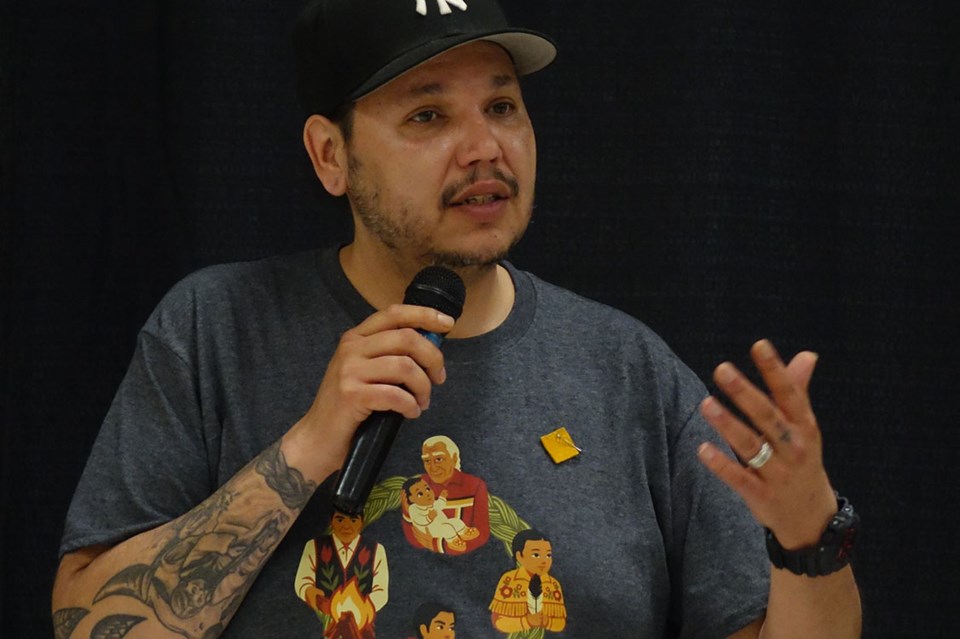Keewatin Tribal Council hosted an awareness walk and an afternoon of guest speakers at the Royal Canadian Legion in Thompson in recognition of Moose Hide Campaign Day on May 11.
A grassroots Indigenous-led movement to reduce violence against woman and children that began in British Columbia, the Moose Hide Campaign has distributed over three million moose hide pins, which are worn to signify one’s commitment to honour, respect and protect women and children.
Although violence against women and children is overwhelmingly, though not exclusively, perpetrated by men, speakers at the KTC event stressed that it is not only up to individuals but to communities, organizations, governments and society as a whole to ensure that mechanisms are in place to support all people, since violence is often the result of anger instigated by inequality and mistreatment, creating a self-perpetuating cycle in which those who were once abused become abusers themselves.
“Many of us were not given the skills as a young man to deal with [emotional trauma] and how to handle it, how to cope,” said Greg Robson, a healing and prevention initiatives co-ordinator with Manitoba Keewatinwi Okimakanak’s Missing and Murdered Women and Girls Liaison Unit’s MAPS project.
Robson says he is a recovering addict and that he was led down that path by a lack of self-worth resulting from parental abandonment.
“I thought to myself, ‘I was given away twice, who would want to spend any time with me?’” said Robson, who says it’s important for anti-violence programs to not only equip men with the skills to deal with their own emotions but the ability to pass on that knowledge and mentor others in their journeys.
Domestic violence doesn’t only affect those who experience it personally, said Oswald Sawh, board chair for Men Are Part of the Solution, which offers services including counselling and supportive transitional housing for men with addictions who are trying to stay sober and deal with their own anger and hurt.
“I grew up in an abusive home,” he said. “I was too young at the time to be smacked around by my father but I saw enough of the violence on my other siblings. What do you think it does to a little child when you see that level of violence? Whether it’s done by the mother or the father, it has a fundamental impact on your worldview.”
Physical assaults aren’t the only way that men can hurt the women and children they claim to love, said KTC health director John Spence.
“I didn’t do domestic violence when I was drinking,” he said. “However, there was an awareness. There were things I said to my partner that I shouldn’t have said and I can’t apologize for that.”
Even being emotionally unavailable has an effect on your family members, said Greg Fontaine of MKO’s mobile crisis response team.
“I didn’t know how to express my emotions,” he said. “I didn’t know where it was safe to express my emotions because the only thing I saw is anger.”
That, said Fontaine, is a legacy of the residential school system, which traumatized so many Indigenous people that they shut down emotionally as a way to cope. He also took issue with the Western medicine idea that only therapists or psychologists or medication can help people mentally and emotionally heal.
“From time immemorial, we knew how to do these things,” he said. “My message to everyone we work with is you know exactly what it is that you need. You are capable of the things that are being put into your life that are good for you. We are blessed, the way that we gather, the way that we speak, the way that we love, the way that we share the kindness. That is medicine. No doctor can prescribe that.”
Francis Budd, the MKO mobile crisis response LGBTQ2S team member, said it took time to be able to speak and be vulnerable in front of other people, which is part of their healing journey.
“For a very long time, I shut down my voice. I experienced a lot of bullying growing up. I experienced a lot of the impacts of intergenerational trauma and the way those things influenced my family,” Budd said.




